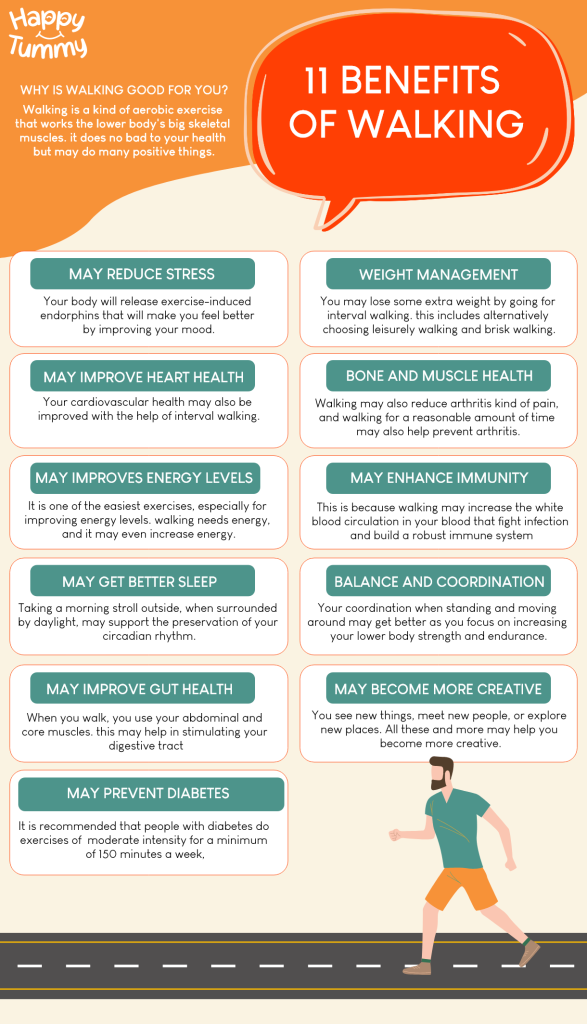Table of Contents
Do you know walking for at least 30 minutes or more a day can help you maintain or improve your overall health? Surprised.
Walking is a great activity that you can do to keep yourself fit and fine. Even if you can’t manage a 30-minute walk, you can start with short walks and gradually increase the duration.
Even though walking is exercise, walking with your favourite person can be more enjoyable. So, why wait? In this article, let’s look at the benefits of walking.
However, remember, if you are not habitual of exercising or even going on walks or have any medical condition, always consult your doctor before beginning.
Till then, let’s know the benefits.
Why is Walking Good for You?
Walking is a kind of aerobic exercise that works on the lower body’s big skeletal muscles. It does no bad to your health but may do many positive things.
Walking more quickly than usual, regularly, and over a long enough distance might help you maintain your physical fitness.
Why is Morning Walk More Popular?
We all have heard the famous saying, “early to bed and early to rise, makes one healthy, wealthy, and wise”. But we may have never questioned the reason or logic behind it.
If you look around at the life of any physically fit person, there is one thing you will find common. They go to bed at a fixed time, wake up early, and physically engage in some or other activity.
Taking a morning walk is the best physical activity to keep you energized and active the entire day. It is even easier than going to the gym every day.
People prefer morning walks because they can manage their time before getting busy with their daily chores.
Besides, morning walks also give the added advantage of soaking an excess amount of vitamin D. The UV rays in the morning are less harmful.
Hence, this sun exposure is beneficial as you get your daily dose of vitamin D without damaging the skin.
So, don’t wait long; start your daily morning walk and take advantage of its numerous health.
Benefits of Walking
Are you worried about physical activity being complicated? Do you know that even a simple brisk walk is an excellent activity with numerous health benefits? Let’s find out.

#1. May Reduce Stress
Walking is an excellent way of getting rid of any daily stress. Moreover, your body will release exercise-induced endorphins that will make you feel better by improving your mood.
Moreover, spending more time in nature while walking may also lower your stress hormones. It may also boost creativity, memory, and work satisfaction.
You only need 10 minutes of walking to lift your spirits. Regular walking may even help with the nervous system, decreasing hostility and anger issues[1].
#2. May Help With Weight Management
You may lose some extra weight by going for interval walking. This includes alternatively choosing leisurely walking and brisk walking.
You may engage in at least 30-45 minutes of moderate-intensity physical activity, such as walking for at least five days a week, which may assist you in weight management.
This kind of walking may help in reducing more calories than standard walking. Also, it may take less time than usual.
People who walk may also have less body fat than others. How much you burn as calories may depend on certain factors, such as:
- Distance covered
- Walking speed
- Your weight
- The terrain you choose – you may burn more calories when you walk on a hill instead of a flat area.
Brisk walking may also help boost your metabolism and lean muscle mass. If you want to lose weight, take faster steps and keep a steady speed.
Doing so will make you breathe faster and your heart beat faster. It is a method to get in the fat-burning zone and may help you lose calories.
However, remember that walking alone may not help you lose weight. You may want to include healthy eating habits and pair it with a balanced diet[2].
You can contact our nutritionist for a tailor-made diet plan that meets your requirements.
#3. May Prevent Diabetes
People who may be at risk of diabetes or are suffering from it may benefit from including walking in their daily routine.
It is also recommended that people with diabetes do exercises of moderate intensity for a minimum of 150 minutes a week, i.e., 30 minutes per day for five days a week.
It may help control blood sugar levels by improving peripheral circulations, increasing the body’s response to insulin, and muscle mass. Simply said, daily walks may help them keep manage their symptoms[3].
#4. May Improve Heart Health
Walking faster than average is considered an excellent aerobic activity. This may improve your heart health while burning more calories.
Your cardiovascular health may also be improved with the help of interval walking, as we discussed in weight management.
Because the calf functions as a venous pump, contracting and pumping blood from the feet and legs back to the heart, it may also lessen the danger of blood clots by reducing the strain on the heart.
It may also lower cholesterol levels, reduce high blood pressure, and enhance lung capacity. These factors may improve heart rate, reducing the risk of heart ailments[4].
#5. May Improve Bone and Muscle Health
Walking is an excellent way of strengthening your muscle and bone health. It may be great for your joints and keep them flexible and lubricated.
Walking may also reduce arthritis kind of pain, and walking for a reasonable amount of time may also help prevent arthritis.
Joint lubrication may help prevent osteoarthritis by strengthening the muscles in your hips and knees. Walking may even improve your body posture, further supporting your bones and muscles[5].
#6. May Improves Energy Levels
Most people do not consider walking as an actual workout. It is because people may think it to be common, easy, relaxed, or enjoyable.
However, it is one of the easiest exercises, especially for improving energy levels. Walking needs energy, and it may even increase energy.
You may have better energy levels and stamina after a walking session. However, you may want to make it a regular activity to see a difference in your energy levels[6].
#7. May Enhance Immunity
You may also fall sick less if you walk daily compared to if you only do a workout once a day in the week. Moreover, even if you fall ill, your symptoms won’t be intense, and you may recover soon.
Why? This is because walking may increase the white blood circulation in your blood. Hence, it may be beneficial during the cold and flu season when immunity is generally low.
You need these cells to fight infection and build a robust immune system[7].
#8. May Get Better Sleep
We all know that physical activity can induce better sleep. Taking a morning stroll outside, when surrounded by daylight, may support the preservation of your circadian rhythm.
You may relax and relieve tension by walking, which might help you sleep better[8].
#9. May Improve Balance and Coordination
Over time, you may improve your coordination and balance when walking. Your coordination when standing and moving around may get better as you focus on increasing your lower body strength and endurance.
When your coordination and balance are improved, it may also enhance your confidence, which you need to perform your daily activities[9].
#10. May Improve Gut Health
Digestion is becoming a cause of concern for most people today. It generally happens because of stress, environmental issues, and poor eating habits.
But the good news is it may be managed with walking. When you walk, you use your abdominal and core muscles. This may help in stimulating your digestive tract[10].
So, are you ready to improve your digestive health? Start walking today. However, do you know how your gut health is at present?
Take a quick digestive quotient test and figure it out.
#11. May Enhance Your Creative Instincts
The best part about walking is you leave the comfort of your house. You see new things, meet new people, or explore new places.
All these and more may help you become more creative. This creativity may help you on your personal and professional fronts.
So, next time, if you have a creative block or are not getting new ideas, take a small stroll in your neighbourhood, and you may feel more creative[11].
How Much to Walk?
The more frequent, farther, and faster you walk, the more will be its benefits. For instance, you may begin as an average walker and gradually increase to walking at a quicker pace and finishing faster than the typical walker, much like power walkers.
According to the ICMR-National Institute of Nutrition, adults should do 30-45 minutes of brisk walking to maintain good health.
How to Include Walking in Your Daily Routine?
Here are seven simple ways of including walking in your daily routine:
- Walk in the park
- Actively play with children
- Take meetings or calls while walking
- Use the stairs
- Take a small walk break
- Walk to the office, if possible or park your vehicle away from your work
- Create social walk groups
- Move around every few minutes while watching TV, especially during commercials.
Things to Remember Before You Take Walking as an Exercise
Almost everyone, including older people, can indulge in physical activity or exercise. However, as a thumb rule, check with your doctor before starting anything new.
It is especially needed if you have no exercise habits or have not done them in a long time. Similarly, even with medical conditions, you must consult to know how much to walk and at what speed.
Remember to check what to keep in mind when you start to walk. Should you start with a brisk walk, or leisure walk, or can you do a fast steps, steady walk?
You may want to start slow and for shorter durations if it is your first time. Also, if you feel uncomfortable, you must seek your doctor’s advice before continuing it.
Final Thoughts
Irrespective of whether you want to go for a leisure stroll or a brisk walk in your area, it is essential to include walking in your daily schedule.
Walking for at least 30 minutes daily may help improve your mind and body. Additionally, it may be an excellent way of improving your overall health.
Although there is no harm in brisk walking, and people of any age may do it comfortably, it is always better to consult your doctor before starting with it.
FAQs
Some essential advantages of daily walking are – less stress, healthy weight, discovering new places, lower blood pressure, increased energy levels, and better sleep.
A regular walk may help you in strengthening your muscles and bones. Thus, it may enhance your energy levels and improve muscle endurance, mood, memory, cognition, and sleep.
The number of steps depends on one’s speed, movement, distance and flexibility; therefore, to give an exact estimate of the number of steps can be challenging. However, a 30-minute walk may range from 3000 to 4000 steps.
According to research, healthy adults can take anywhere between approximately 4,000 and 18,000 steps/day. 10,000 steps/day is a reasonable target for healthy adults. [12]
A walk can be done at any time, depending on when you can take time for this activity. However, morning walks are becoming quite popular.















